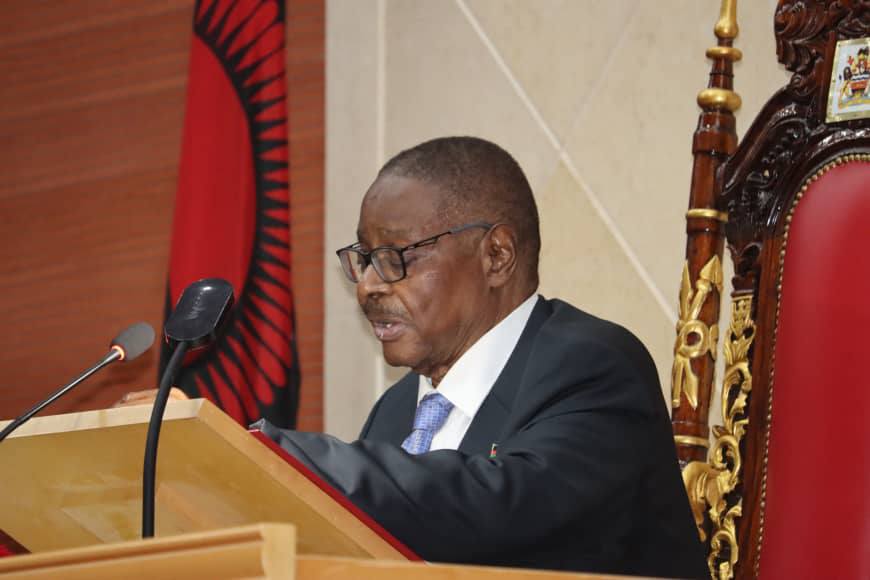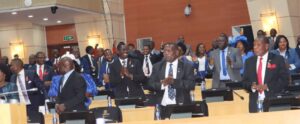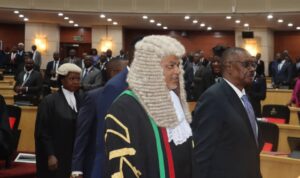
* He immediately revoked government-to-government fuel procurement system and announced return to open tendering system in its place
* He also signalled a swift plan to deal with fertilizer shortages and exorbitant pricing, re-invigorating forex revenue through opening of mines and industrialisation, and securing electricity supply
By Duncan Mlanjira
President Arthur Peter Mutharika evoked the saying that good politics makes good economics by emphasising his priority plan to tackle food, fuel and forex shortages and realigning public service delivery as he officially opened the 52nd session of Parliament in Lilongwe today.

Advertisement
Setting the tone unambiguously during the inaugural sitting of Parliament following his September 16 election victory, Mutharika immediately revoked government-to-government fuel procurement system and announced return to open tendering system in its place.
He also signalled a swift plan to deal with fertilizer shortages and exorbitant pricing, re-invigorating forex revenue through opening of mines and industrialisation, and securing electricity supply.
Mutharika said government planned to open a local fertilizer plant by 2026, ostensibly to cut exorbitant prices of fertiliser imports and deal with ‘fake’ fertilizer supply
“Our long-term plan is to facilitate the establishment of a fertilizer manufacturing plant to ensure availability of affordable fertilizer. A feasibility study for this plan has already been done,” he said, describing as inhuman the practice of selling fake fertilizer.
He ordered the Malawi Bureau Standards and the Police to be on alert to flush out and detect the fake crop nutrients when government rolls out its fertiliser subsidy program in second week of November.
He said this year’s FISP targets 1.1 million people who will receive a total of 55 million kilograms (50 kg each) of chemical fertiliser and a total of 5.5 million kilograms of maize seed (5kg each).

The President announced a new subsidised fertiliser price of K10,000, a cut price from K15,000 to K20,000 during the previous regime.
“My vision on food security remains that no Malawian should die of hunger, despite that we have a food shortage crisis — for which I am importing 200,000 kg of maize from Zambia,” he said.
The President said fast-tracking operations in rare earth, uranium and graphite mining, and increasing electricity generation capacity through the Mpatamanga project formed part of his priorities on efforts to restore the country’s struggling economy.
Turning to the country’s macro-economic fundamentals, Mutharika admitted inheriting an economy in the dire straits, saying the painstaking process to fix it had begun.
“All major macro-economic indicators are misaligned. My administration has already started taking steps to deal with the prevailing undesirable situation by engaging financiers on debt treatment and raising more financing through grants, among others,” he said.
The President said economic growth remains weak at 2.8% of GDP, weighed down by a public debt of MK21.5 trillion, a budget deficit of MK2.4 trillion.

Mutharika’s statement corroborated Finance Minister Joseph Mwanamvekha’s earlier position on Thursday that government would start restructuring local currency debts.
At this year’s ECAMA annual general conference, the Finance Minister indicated that to gain fiscal space, the government was discussing with local creditors such as banks and pensions on a plan to restructure local-currency debt, hovering over MK13 trillion or 80% of GDP.
The development contrasts sharply with the lacklustre and inconsistent efforts by the previous regime on the external debt restructuring.
To deal with fuel scarcity, Mutharika said government would increase its allocation of forex to match with demand as well as diversify import sources.
“In order to ensure stability of fuel supply in the country, my Administration will ensure that fuel imports consistently meet national demand. We will increase allocation of foreign exchange to match import requirement,” he said, adding the return to open tendering system will ensure fast deliveries, efficiency, transparency, and value for money.
Mutharika who described the country’s public service delivery as having collapsed, a far cry from the era when it was a shining star on the world stage. He said specific measures are being taken to address the mediocrity.

Advertisement
“I want efficient service delivery and the integrity of the Civil Service restored,” he said, noting Malawians were struggling to access essential and basic services such as quality education, health care, potable water and sanitation services, passports, driving licences, electricity, and social welfare coverage.
On passports, Mutharika announced that government would commission a heavy-duty printer for passports with a capacity to produce 500 booklets per day, a move he hoped would help end chaos and address congestion at Immigration centres. Passport printing was set to resume in Blantyre, Lilongwe, Mzuzu and Mangochi by end of year, he said.
German Ambassador to Malawi Ute König welcomed the President’s speech, saying it sets a clear tone on fulfilling its commitments for a reset of economic development.
“We are impressed so far with the new government’s approach, and as Germany, we look forward to building on our 61 years of a relationship with Malawi.
“From the day they won the election, the Finance and Foreign Affairs Ministries have reached out and presented very sound and impressive plans on the table,” said Konig.
Development analyst, Eliya Zulu, of development think-tank African Institute for Policy Development (AfIDEP), said a reset of the country’s socio-economic development roadmap was urgently needed and it was pleasing to note that Mutharika’s administration was tackling it from the “demand-side”, which he described as good implementation science.



Advertisement
